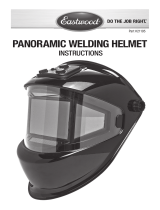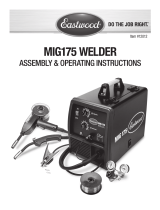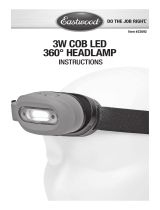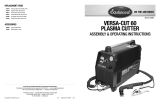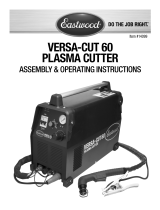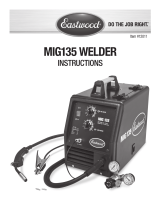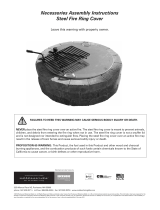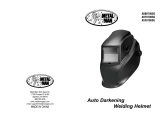Page is loading ...

Item #32082
AUTO DARKENING
WELDING HELMET
INSTRUCTIONS

2 Eastwood Technical Assistance: 800.343.9353 >> tech@eastwood.com
ROCKWOOD AUTO DARKENING WELDING HELMETS are specifically designed to provide maximum
eye and face protection from harmful UV and IR radiation emitted when welding, in a lightweight,
comfortable housing. The Auto-Darkening feature, providing added safety and convenience, is
powered by solar cells and Li-Mn batteries for long, reliable life. Meets ANSI Z-87.1, CE, CSA & AS/
NZS safety standards.
DANGER indicates a hazardous situation which, if not avoided, will result in death or serious injury.
WARNING indicates a hazardous situation which, if not avoided, could result in death or serious injury.
CAUTION used with the safety alert symbol, indicates a hazardous situation which, if not avoided,
could result in minor or moderate injury.
NOTICE is used to address practices not related to personal injury.
SAFETY INFORMATION
The following explanations are displayed in this manual, on the labeling, and on all other information
provided with this product:
READ INSTRUCTIONS
• Thoroughly read and understand this manual before using.
• Save for future reference.
INCLUDES
(1) Auto Darkening Welding Helmet
(1) 3-3/4” x 2” Inner Lens Shield
(2) 4-3/8 x 3-1/2” Outer Lens Shields

To order parts and supplies: 800.343.9353 >> eastwood.com 3
ELECTRIC SHOCK CAN CAUSE
INJURY OR DEATH!
• Improper use of an electric welder and associated equipment can cause
electric shock, injury and death! Read all precautions described in the
specific Welder Manual to reduce the possibility of electric shock.
• The electrode and work (or ground) circuits are electrically “hot” when the
welder is on. Do not allow these “hot” parts or associated equipment to
come in contact with your bare skin or wet clothing.
• Separate yourself from the welding circuit by using insulating mats,
protective clothing, leather welding gloves and insulated footwear to
avoid being part of the welding circuit.
• Be sure that the work piece is properly supported and grounded prior to
beginning an electric welding operation.
EYE INJURY HAZARD!
• If other persons or pets are in the area of welding, use welding screens to
protect bystanders from sparks and harmful arc rays.
• Inadequate levels of arc ray shading can cause permanent eye injury. This
helmet is capable of protection up to shade level 13 only. If your particular
welding process emits arc radiation that requires a shade level higher than
13, DO NOT use this helmet and seek alternate protection.
• Eastwood welding helmets are designed to protect the user’s eyes and face
from harmful radiation, sparks and spatter under normal welding conditions.
They are not intended to offer protection against impact hazards, explosions
or corrosive liquids.
• Wear ANSI approved impact safety goggles under welding helmet.
• Always test Auto-Darkening feature before each use by quickly subjecting
the face of the Welding Helmet to sunlight or other bright light source. If the
Auto-Darkening feature fails to function, permanent eye damage can occur
from exposure to welding flash and radiation, DO NOT USE
• The operating temperature range of the Auto-Darkening feature is 23°F
to 130°F (-5°C to 55°C). The response time may be affected beyond the
described temperatures causing an unsafe condition. DO NOT USE beyond
recommended operating temperature range.
• DO NOT USE this helmet for oxy-acetylene welding or cutting processes,
laser welding or low amperage (less than 10 amps) TIG welding.

4 Eastwood Technical Assistance: 800.343.9353 >> tech@eastwood.com
OPERATION
• Remove the protective film from the inside
and outside surfaces of the lens.
• With normal (non-welding), ambient light
viewing through the lens, the view will
have a slight green tint. When exposed to
bright light or the flash of the welding arc,
the lens will quickly darken your view.
The Sensitivity, Delay Time and Shade Range
switches are located at the upper panel of the
viewing area inside of the Welding Helmet and
are adjustable as follows: (FIG 1).
SENSITIVITY
Controls the Auto-darkening response when
exposed to smaller arcs such as low-amperage
TIG welding and conditions like welding outside
in bright sunlight.
To Adjust Sensitivity: Slide Sensitivity Switch to the High “H” position to increase sensitivity for low
amperage welding. Slide Sensitivity Switch to the Low “L” position when welding in sunlight or bright
ambient light.
DELAY TIME
Delay controls the time interval for the Auto-darkening to return to normal view once arc is stopped.
To Adjust Delay Time: Slide Delay Switch to the Long “L” position to increase the time for the Helmet
to return to normal view after arc is stopped. Slide Delay Switch to the Short “S” position to minimize
the time for the helmet to return to normal view.
FIG. 1
EYE INJURY HAZARD!
Inadequate levels of arc ray shading can cause permanent eye injury.
This helmet is capable of protection up to shade level 13 only. If your
particular welding process emits arc radiation at levels higher than 13,
DO NOT use this helmet and seek alternate protection.
Do not use this helmet for oxy-acetylene welding or cutting processes,
laser welding or low amperage (less than 10 amps) TIG welding.

To order parts and supplies: 800.343.9353 >> eastwood.com 5
SHADE
Shade is used to control the level of viewer darkening
as Auto-darkening is automatically activated when an
arc is present.
This Helmet relies on 2 controls to adjust shade:
The Shade Control Knob (FIG 2) is designed to function
by raising or lowering the amount of shade after using
the Range Switch (FIG 1) to select between 2 separate
ranges; one for shade levels 5 through 9 and one for
shade levels 9 through 13.
Shade 5 is lightest while shade 13 is darkest.
This helmet also has a “GRIND” setting switch which turns off the Auto-Shade feature and keeps the
viewer on base transparency to allow use of the Helmet for grinding and other non-welding uses.
To Adjust Shade:
Consult the SHADE GUIDE TABLE (FIG 3) to verify that this helmet provides adequate protection for
your preferred welding process before using, then use the Guide to choose the correct setting.
If unsure of shade level required, the following procedure may be used to find the correct shade level:
• Set the Range Switch to the “9-13” position, set Knob to 13 and try viewing with an expected
arc. This is the darkest possible setting and no arc may be viable
• Continue to incrementally decrease the setting while striking an arc until it becomes visible
with Auto-Darkening.
• This is the correct setting.
MAG/C02 – Metal Active Gas
SAW – Shielded Semi-Automatic Arc Welding
PAC – Plasma Arc Cutting
PAW – Plasma Arc Cutting
SMAW – Shielded Metal Arc Welding
MIG (heavy) – MIG on Heavy Metals
MIG (light) – MIG on Light Alloys
TIG, GTAW – Gas Tungsten Arc Welding
Shade Guide Table
Welding
Process
Arc Current (Amperes)
SMAW
MIG (heavy)
MIG (light)
TIG, GTAW
MAG/C02
SAW
PAC
PAW
0.5 2.5 10 20 40 80 125 175 225 275 350 450
1 5 15 30 60 100 150 200 250 300 400 500
9 10 11 12 13 14
10 11 12 13 14
10 11 12 13 14 15
9 10 11 12 13 14
10 11 12 13 14 15
10 11 12 13 14 15
11 12 13
8 9 10 11 12 13 14 15
FIG. 3
FIG. 2

6 Eastwood Technical Assistance: 800.343.9353 >> tech@eastwood.com
TO SET SHADE CONTROL TO “GRIND”:
Rotate the Shade Control Knob beyond the 9/13 setting
and past the detent fully to the “GRIND” position (FIG 4)
which will lock the viewer on full transparency.
WARNING: To avoid serious and permanent eye damage,
NEVER attempt to weld with the Shade Control set to
“GRIND”.
ADJUST FIT OF HELMET
Headband: Push Knob in and Turn Clockwise for decreasing size (tighten) or rotate Counter-Clock-
wise to increase size (loosen).
Width/Height: Push in rectangular latch on the two overhead bands, slide bands in to shorten band
or pull out to lengthen bands. Snap button into the nearest available rectangular holes.
Flip-up Retention: This will allow the helmet to stay in the “flipped-up” position. Tighten or loosen
knobs on either side of the helmet to increase or decrease friction.
MAINTENANCE
• This Welding Helmet is powered fully by solar rechargeable batteries that will provide a
minimum of 5,000 hours of protection. With only occasional use, the batteries may require
a charge by exposing the face of the Welding Helmet to bright sunlight for several hours.
• Clean outside and inside of lens with a soft cloth and small amount of glass cleaner.
NOTE: Do not use excessive glass cleaner or allow the lens assembly to become wet or the
sensitive electronics will be destroyed. Never use solvents.
• Clean headband with a cloth dampened with mild soap and water. Allow to dry thoroughly.
• Check lens assembly for damage before each use. If cracked or broken, DO NOT USE.
FIG. 4

To order parts and supplies: 800.343.9353 >> eastwood.com 7
Replace Outer Lens Shield
• Insert tip of the forefinger into the
semi-circular recess at the bottom
of the viewing area, pry the Lens
outward while curling it outward in
the center then upward and away
from Helmet (FIG 5).
• Reverse to install by squeezing
sides to curl the center outward
then insert edges into channels
around frame of opening (FIG 5).
Replace Inner Lens Shield
• Insert tip of the forefinger into the
semi-circular recess at the top
of the viewing area; pry the Lens
outward while curling it inward in
the center then away from under
retaining tabs (FIG 6).
• Reverse to install by squeezing
sides to curl the center inward then
insert edges under the retaining
tabs (FIG 6).
FIG. 5
FIG. 6

ADDITIONAL ITEMS
#32083 Replacement Outer Lens Shield
#32084 Replacement Inner Lens Shield
#21520 Replacement Head Gear
© Copyright 2019 Easthill Group, Inc. 4/19 Instruction item #32082Q Rev 1
If you have any questions about the use of this product, please contact
The Eastwood Technical Assistance Service Department: 800.343.9353 >> email: tech@eastwood.com
PDF version of this manual is available at eastwood.com
The Eastwood Company 263 Shoemaker Road, Pottstown, PA 19464, USA
800.343.9353 eastwood.com
PROBLEM CAUSE CORRECTION
Auto-Dimming
Does Not
Function
(will not
darken)
Dirt may be blocking
sensors located at
upper area of the lens
assembly
Clean lens assembly.
Batteries
may be low
Expose the solar cells to bright light source
to recharge.
Dirt may be blocking
solar cells at upper
portion of viewer area
Clean lens assembly.
Slow Response
for Darkening
Operating temperature
too low
Do not use below 23°F (-5°C).
Sensitivity setting may
need adjustment
Follow “Sensitivity” section in instructions
for adjustment procedure.
Poor Vision
Through Lens
Dirt or excessive pitting
may be blocking view
Clean lens assembly.
Helmet Slips
During Use
Helmet fit not adjusted
properly
Follow fit adjustment steps in instructions.
TROUBLESHOOTING
/

